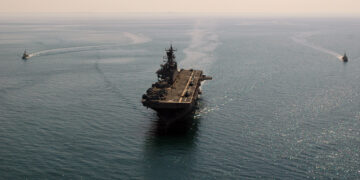June 20, 2019
Iranian escalation is a predictable outcome of maximum pressure, not justification for U.S. military strikes
FOR IMMEDIATE RELEASE:
June 20, 2019
Contact: press@defensepriorities.org
WASHINGTON, DC—On Thursday, the White House briefed Members of Congress on Iran’s recent shoot-down of an unmanned U.S. drone in international airspace near its coastline. Defense Priorities Policy Director Benjamin H. Friedman issued the following statement in response:
“We don’t need to absolve Iran of any blame to admit its recent escalation is a predictable result of maximum pressure. Iran interventionists, led by National Security Advisor John Bolton and Secretary of State Mike Pompeo, have pushed Tehran toward desperate acts that create a pretext for conflict.
“Since pulling out of the JCPOA, despite Iran’s compliance, Washington has reimposed nuclear sanctions to reduce Iran’s oil exports to zero and strangle its economy.
“It does not surprise foreign policy realists that Bolton and Pompeo’s approach has resulted in Iran acting desperately to escape maximum pressure and economic devastation, not surrender. These are predictable outcomes of unrealistic U.S. policies, not justification for military strikes or war.
“The U.S. should not take massive risks for minor deterrence gains or confuse the safety of drones with vital U.S. security interests. Nor should we fight wars to protect foreign shipments, especially when those governments oppose war.
“Despite Iran’s misdeeds, military strikes would be futile and reckless. Even so-called ‘limited’ or ‘targeted’ airstrikes could escalate to outright war with Iran, which could leave the U.S. military embroiled in an occupation far more bloody than Iraq. Strikes would also prevent any chance of negotiations with Iran, the president’s stated goal. We need not match Iran’s desperation with our own.”
More on Iran
Featuring Jennifer Kavanagh
August 28, 2025

Featuring Jennifer Kavanagh
July 28, 2025
Events on Iran







